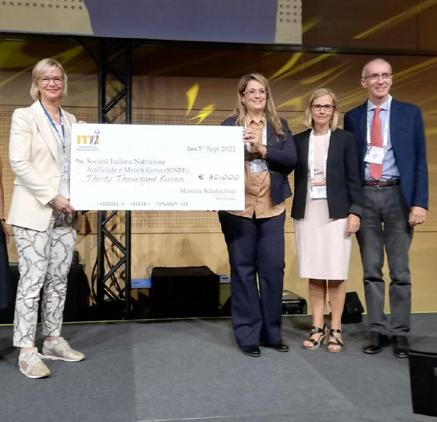
3 minute read
1. Advancing medical knowledge and expertise
MNI supporting ESPEN Guidelines
MNI financial contribution to the development of the ESPEN app on guidelines continues. The funds allow ESPEN to complement the app with additional guidelines. New features and activities to improve users’ experience and sharing opportunities are also envisaged soon.
Advertisement
MNI 2022 Grant
The €30,000 MNI Grant rewards national initiatives or research projects promoting optimal nutritional care. Since 2008, the MNI Grant has supported projects contributing to improving nutritional care policies at national level – all endorsed by (parenteral, enteral nutrition) PEN or our sister societies worldwide.
This year’s grant was awarded to the project “Empowering junior medical oncology clinicians on cancer-related malnutrition” submitted by SINPE (Italian Society of Clinical Nutrition and Metabolism). The project aims to evaluate junior medical oncologists’ awareness regarding the frequency of malnutrition, sarcopenia and cachexia in oncologic patients and their role in influencing both patient outcome and potential therapeutical approaches, using a multiple-choice questionnaire. The final objective is to sensitize oncologists toward early identification of patients at risk of malnutrition or malnourishment, and to educate them to provide appropriate nutritional care.
We look forward to celebrating the 15th year of the MNI grant in 2023!
EuGMS SPRIN-G meeting
SPRIN-G is an educational project and annual event of the European Geriatrics Medicine Society (EuGMS) Global Europe Initiative (GEI).
MNI financially supported the project, which explored through a two-day meeting the topic: “Ageing trajectories and healthy ageing as a life-long dynamic process: impact of diet patterns on the trajectory of neurocognitive decline”. SPRIN-G aims to go beyond the standard meetings of healthcare professionals and patients by inviting representatives from the political, social, and cultural sectors to take part in discussions on ageing.
MNI and EuGMS are assessing the best ways to collaborate in the future, as our organisations share mutual interests and plans – medical nutrition in elderly and frail people being a key focus of MNI.
Home Parenteral Nutrition
Parenteral Nutrition is an integral part of the management of adults and children when food and fluids cannot be absorbed normally or if oral/enteral feeding is not possible or sufficient. Home parenteral nutrition (HPN) is defined as parenteral nutrition administered outside the hospital, either at home or at a nursing home. HPN is considered a valid option for improving quality of life in patients whose conditions require long-term parenteral nutrition.
MNI is developing communication materials to raise awareness on the feasibility, safety, clinical and economic value of HPN. It is also undertaking research to highlight the unequal access to HPN across Europe and promoting projects to overcome the lack of standardised discharge and homecare treatment protocols guiding smooth transfer of patients from hospital to home.
Following the launch of the MNI “Home nutritional care” website in 2019, several materials were posted and disseminated through the MNI communication channels and to relevant stakeholders:
• Video-animation “From hospital to home with parenteral nutrition”. This video was also translated into Polish to accommodate the request of the HAN patient organisation.
• Interviews of key opinion leaders on the importance and quality of nutritional care at home
• Promotion of the ESPEN Guidelines on HPN.
In 2022, we focussed on producing a HPN Access Mapping Report “Understanding access to HPN across Europe”. MNI commissioned a third-party to interview clinicians, payers, and policymakers across eight European countries to understand why these differences in access to HPN occur, with a view to improving equity of access across Europe. The results indicate that determinants for HPN access are multifactorial – depending on legislation, clinical pathways, enforcement of existing ESPEN clinical guidelines, and reimbursement.
A MNI White Paper on the factors contributing to unequal access to HPN in Europe is currently being finalized. This will be the basis for MNI’s work advocating for equal access of HPN across Europe through three main asks:
• To achieve equitable patient access to HPN across Europe, common frameworks for supportive legislation need to be established, HPN clinical guidelines need to be more consistently implemented, further reimbursement for HPN must be provided, and the management, organisation, and delivery of HPN all need to improve.
• Greater efforts are needed to better educate and inform decision-makers of current evidence and expert opinion in treatment guidelines. ESPEN guidelines provide evidence-based recommendations on the appropriate and safe use of HPN. Nonetheless, the degree to which these guidelines are used across Europe varies. Improving adherence with treatment guidelines will lead to improved access to HPN among those patients who need it.
• Action is needed by payers to address setting, indication, and regional reimbursement limitations to improve patient access to HPN.
Through the HPN stream of work, MNI also supported the Pancreatic Cancer Europe association – please see the ‘Partnership’ chapter of this report.





